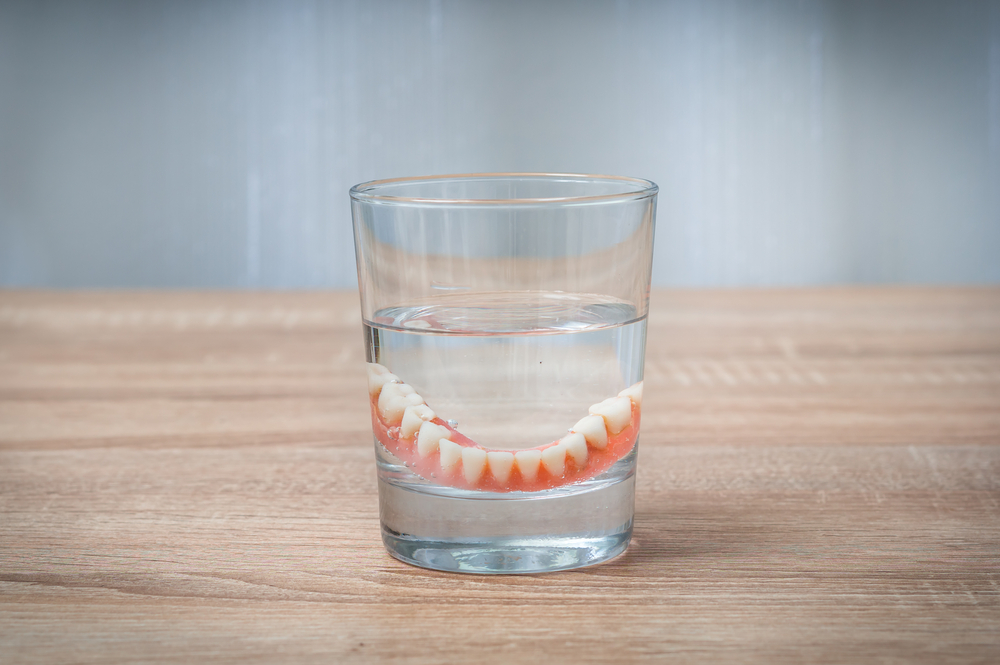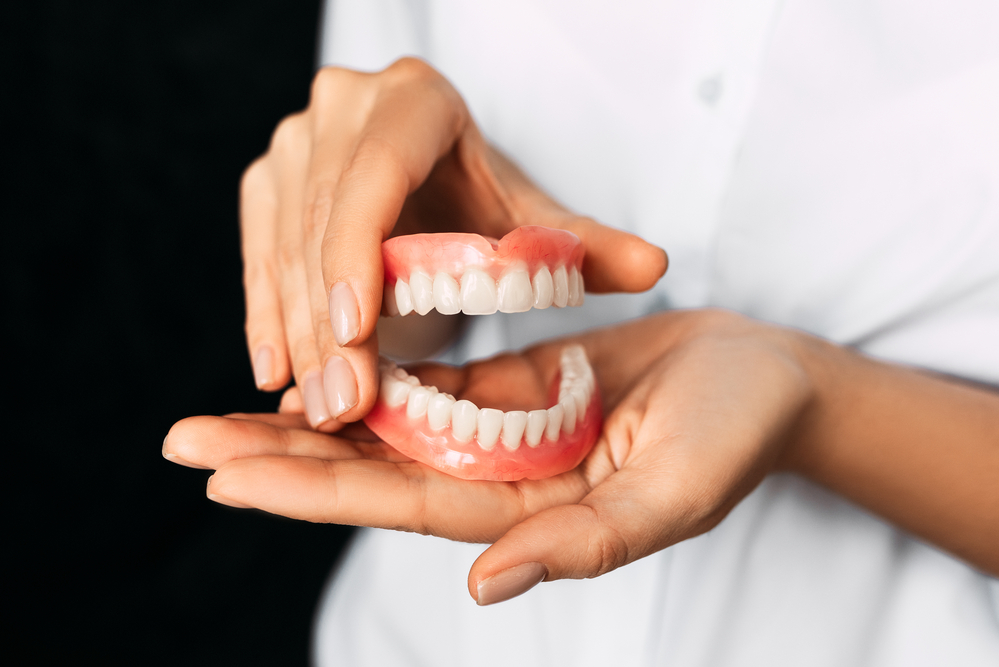Consider your comfort and oral health needs when choosing between partial or full dentures. Make an informed decision considering all aspects before finalising your choice.
What Are Dentures?
Dentures are removable replacements for missing teeth. They come in two main types:
- Full dentures: Replace all teeth in your upper or lower jaw.
- Partial dentures: Replace one or a few missing teeth.
Made from materials like acrylic or nylon, dentures restore your smile and ability to chew.
Partial vs. Full Dentures: A Quick Comparison
| Feature | Partial Dentures | Full Dentures |
|---|---|---|
| Number of Teeth Replaced | Replaces some missing teeth | Replaces all teeth |
| Recommended For | A few missing teeth with healthy surrounding teeth | Most or all teeth missing |
| Cost | Generally less expensive | Generally more expensive |
| Benefits | – Prevents remaining teeth from shifting – Improves appearance and speech – Easier eating | – Improves appearance and speech – Easier eating |
| Disadvantages | – Can break if not handled carefully – Can slip or fall out (especially without implants) – Requires adhesives for some – May affect taste (due to coverage of palate) | – Can break if not handled carefully – Can slip or fall out (especially without implants) – Requires adhesives for most – May affect taste (due to coverage of palate) – May require bone grafting (in some cases) |
| Removable | Yes | Yes |
| Speech Impact | Minor impact (mostly temporary) | May take time to adjust to speaking clearly |
| Cleaning | Requires regular cleaning and soaking | Requires regular cleaning and soaking |
| Durability | May require repairs or replacements more often | May require repairs or replacements more often |
| Bone Loss | May slow down bone loss in jaw | May accelerate bone loss in jaw (without implants) |
| Lifestyle | May offer more freedom in eating and speaking | May require lifestyle adjustments (eating, speaking) |
Benefits of Partial Dentures
When considering tooth replacement options, partial dentures offer a comfortable and functional solution. These custom-made dental appliances are designed to fit securely in your mouth, providing a natural appearance while supporting oral health. Partial dentures are removable, making cleaning both the dentures and your gums easier. They help maintain the alignment of your remaining teeth, allowing for proper chewing and eating without discomfort. By filling in the gaps left by missing teeth, partial dentures prevent issues such as shifting teeth or jaw misalignment.
One key benefit of partial dentures is their cost-effectiveness compared to other tooth replacement options. They provide a more affordable solution without compromising on quality or functionality. Additionally, partial dentures can be adjusted and customized to ensure a perfect fit, enhancing the wearer’s comfort and confidence. Overall, partial dentures offer a practical and convenient way to restore your smile and improve your quality of life.
Benefits of Full Dentures
With their ability to provide comprehensive tooth replacement, full dentures offer a practical and functional solution for individuals seeking to restore their smile and oral functionality. Full dentures are designed to fit securely in the mouth, promoting comfort while eating and speaking. They are custom-made to ensure a proper fit, which enhances their appearance and allows for natural-looking teeth.
Proper care and maintenance of full dentures are essential for their durability and longevity. Regular cleaning and adjustments by a dental professional help ensure a proper fit and functionality. Full dentures can significantly improve individuals’ quality of life by restoring their ability to eat and speak confidently. Their durability and ease of adjustment make them convenient for those seeking a reliable tooth replacement solution.
Considerations for Partial Dentures
Considering various factors such as functionality and aesthetic appeal is crucial when deliberating on the suitability of partial dentures for tooth replacement. When deciding on partial dentures, several key considerations can help ensure the best fit and outcome for the individual’s oral health and overall well-being:
- Custom Design: Each partial denture is uniquely crafted to fit the individual’s mouth, ensuring optimal comfort and functionality.
- Clasp Design: The design of clasps plays a significant role in the stability of the partial denture, providing secure attachment to adjacent teeth.
- Proper Care: Proper oral hygiene and caring for the partial dentures according to the dentist’s instructions are vital for long-term durability and oral health.
- Comfort: Comfort is paramount when wearing partial dentures; adjustments may be necessary to achieve the perfect fit.
- Fitting: Ensuring a precise fitting of the partial dentures is essential for stability during speaking and eating, preventing discomfort or shifting.
Considerations for Full Dentures
For optimal oral health and functionality, selecting appropriate full dentures requires meticulous evaluation of various aspects to ensure a comfortable and secure fit. When considering full dentures, consulting a dentist is crucial to assess the condition of the jaw, oral health, and facial muscles. A dentist will determine whether complete or partial full dentures are necessary based on individual needs.
Custom full dentures are tailored to fit each patient’s unique jaw structure, ensuring a snug and natural feel. These dentures are typically made from resin or acrylic materials that mimic the appearance of natural teeth. The custom design helps maintain facial muscle tone and overall oral health.
Full dentures are a comprehensive treatment option for individuals who have lost most or all of their teeth. They restore the ability to chew, speak, and smile confidently, enhancing quality of life. Regular check-ups with a dentist are essential to ensure that the full dentures continue to fit properly and function effectively.
Comparing Comfort and Functionality
When evaluating full dentures, a critical aspect to consider is comparing their comfort and functionality for optimal oral health and quality of life. Comfort plays a significant role in how well dentures are tolerated and used daily, while functionality ensures that essential activities like chewing and speaking are not compromised. Here are key points to consider:
- Comfort: Full dentures should fit securely without irritating the gums or mouth.
- Functionality: Dentures should allow for proper chewing and speaking abilities without slipping.
- Oral Health: Good-fitting dentures promote oral health by maintaining the alignment of surrounding teeth.
- Muscle Support: Properly fitted dentures support facial muscles, aiding in a natural smile.
- Implant Options: Some may opt for implant-supported dentures for increased stability and functionality.
Choosing between partial and full dentures should prioritise comfort and functionality to ensure a confident smile and overall well-being.
Cost Analysis: Partial Vs. Full Dentures
When comparing partial and full dentures, a crucial aspect is the cost analysis involved in determining the most economical and suitable option for individuals seeking dental prosthetic solutions. The cost analysis of partial dentures typically varies based on the materials used, the complexity of the fit, and whether they are temporary or permanent solutions. Partial dentures are often more affordable than full dentures as they only replace a few missing teeth, reducing the overall cost for the patient. On the other hand, full dentures, which replace all teeth in the upper or lower jaw, may be more expensive due to the increased materials and labour required for their fabrication.
When assessing the cost analysis, the long-term benefits and durability of partial and full dentures must be considered. While partial dentures are a cost-effective solution for some patients, others may find that full dentures provide a more permanent and comfortable fit, ultimately justifying the higher initial cost. Patients should consult their dentists to determine the most suitable option based on their budget and long-term wearing needs.
Additional Considerations
- Customization: Both dentures are customized for a comfortable fit, but full dentures may require more customization due to the entire jaw needing coverage.
- Material: Both dentures typically have a gum-like plastic base. Partial dentures may have additional metal clasps for anchoring to remaining teeth.
- Dental Implants: Implants can improve the stability and retention of both full and partial dentures.
Choosing Between Partial and Full Dentures
The best option for you depends on the number of teeth you’re missing, the health of your remaining teeth, and your jawbone health. Consulting a dentist will help determine which type of denture (or if any) is the right fit for you. They can also discuss options like dental implants to improve the functionality and longevity of your dentures.
Key Takeaways
When deciding between partial and full dentures, it is essential to consider the benefits and considerations of each option.
Partial dentures offer the advantage of preserving natural teeth, while full dentures provide a complete solution for missing teeth.
Comfort and functionality play a crucial role in the selection process and cost considerations.
By carefully weighing these factors, individuals can choose the option that best suits their needs for optimal oral health and overall well-being.
Schedule a consultation with Dentists at Edgecliff NSW 2027 for personalised guidance and expert advice on denture options. Take the first step towards achieving a confident smile and optimal oral health today.




